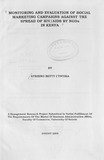Monitoring And Evaluation Of Social Marketing Campaigns Against The Spread Of HIV/AIDS By NGOs In Kenya.
Abstract
Kenya like many developing countries continues to grapple with problems like poverty, ignorance and disease among others. The GoK together with NGOs are in a concerted effort to try and solve the HlV/AIDS pandemic in the country. The objective of the study was to determine whether NGOs in Kenya involved in campaigns against the spread of HIV/AIDS undertake monitoring and evaluation of their social campaigns and to establish the challenges faced by NGOs in monitoring and evaluating their social campaigns.
The population of interest in this study was all NGOs involved in social marketing campaigns against HIV/AIDS in Kenya and registered by KANCO. There are 821 NGOs registered by KANCO as at July 2005, 218 of which have physical addresses known to KANCO (KANCO database, 2005). Random sampling was conducted among the 218 NGOs and 50 NGOs were selected.
Data collected was analyzed using frequency distributions, mean scores, standard deviations and percentages. Primary data was collected using semi-structured questionnaires. The questionnaire was divided into three sections with each section aiming to collect specific information of the respondents and their organizations. The data was analyzed using descriptive statistics, frequency distributions, percentages, mean scores and standard deviations were used in the analysis.
A response rate of 92% was achieved. The findings indicate that most organizations engage in post-campaign evaluations annually and semitv:
annually, and this is likely to make information obtained obsolete as the information is put to use later in time after the campaign. Monitoring and evaluation should be conducted on a continuous basis to help tract reassess priorities and compile an evidence base for future funding proposals. There is need for a framework and indicators to act as a guide to evaluators. Some organizations did not participate in the study and the study was limited to outcome and process measures. The small sample size of 50 respondents and pre-determined survey questions could have limited confidence in the results. There is need to replicate the research to incorporate a large sample and ethical measures.
Publisher
university of Nairobi
Rights
Attribution-NonCommercial-NoDerivs 3.0 United StatesUsage Rights
http://creativecommons.org/licenses/by-nc-nd/3.0/us/Collections
The following license files are associated with this item:


